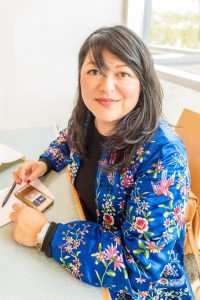This International Women’s Day 2021, we decided to connect with inspiring women championing inclusion at UBC to hear their reflections on this day and perspectives on a more equitable and inclusive future.

she/her/hers
they/them/theirs
Associate Professor, School of Social Work, UBC Okanagan
What does IWD mean to you?
As a university professor, International Women’s Day reminds me of the significant importance for all girls and women to have equal access to education and pathways to complete their education. This means dismantling the structures that create and sustain inequality for girls and women, and their human right to equity in accessing school supplies, safe and healthy spaces and supportive communities for learning, and access to mentorship throughout the life course.
Can you tell us a bit about your research on social marginalization due to race, ethnicity and other factors?
This is only one of several areas in my program of research on social marginalization and the impacts on access to social services and health care. My work in this area was guided by my own and the witnessing of other racialized people’s frequent and repeated experiences of having their daily lives interfered with and imposed upon by others who do not or choose not to understand that racialized people are human beings with feelings, intelligence, and futures. The importance and implications of this work and the gifts of wisdom I have gained from bearing witness as a researcher, a person, and a racialized woman is to share insights from research and work already done by Indigenous, Black, and racialized women to the forefront from developing the research question and methodologies, to the analysis of women’s experiences from their point of view and contexts. There are many stories that need to be heard in complete forms and voices.
What has your own journey to leadership like?
My journey began in graduate school where courageous Indigenous and Black women students were doing the work of challenging the colonial dominant narratives about Indigenous, Black, and racialized people and communities in the theories and practice frameworks we were asked to study. I was and am still blessed with mentors who stay in my life such as professors, educators, friends and colleagues, students, who would step into my life at key moments to guide my way to step into leadership roles to do the work. My quest is to pay it forward so that other women become leaders in their own right to continue to lift others up especially when no one is looking.
How can social work be used to help bring about good outcomes in society?
Intersectional anti-racist practice is the new normal that benefits all people when done right. More than ever, social work needs to deeply engage with meaningful antiracist practices. This includes antiracist thinking in how policies are developed and designed because they translate into how people see and do things. Moving forward and learning from the lessons of 2020, the COVID-19 pandemic has shown how systemic racism harms Indigenous, Black, and racialized peoples and communities near and far, including in local neighbourhoods with racially targeted violence that often goes unnoticed or minimized.
Social work is also in the perfect spot to do the work at multiple systems to support all women because the impact of the COVID-19 pandemic has affected every area of life, and that women with their multiple roles and responsibilities need consistent support through social service programs and social policies to fill the gaps in for example, child care, elder care, health care, and reproductive health.
How do you plan to challenge current norms and support the intent behind this IWD?
I will support and promote women’s achievements.
What’s your one self-care tip to other women?
That’s easy during the COVID-19 pandemic: unplug from the screens and do something helpful for others (while physically distancing).